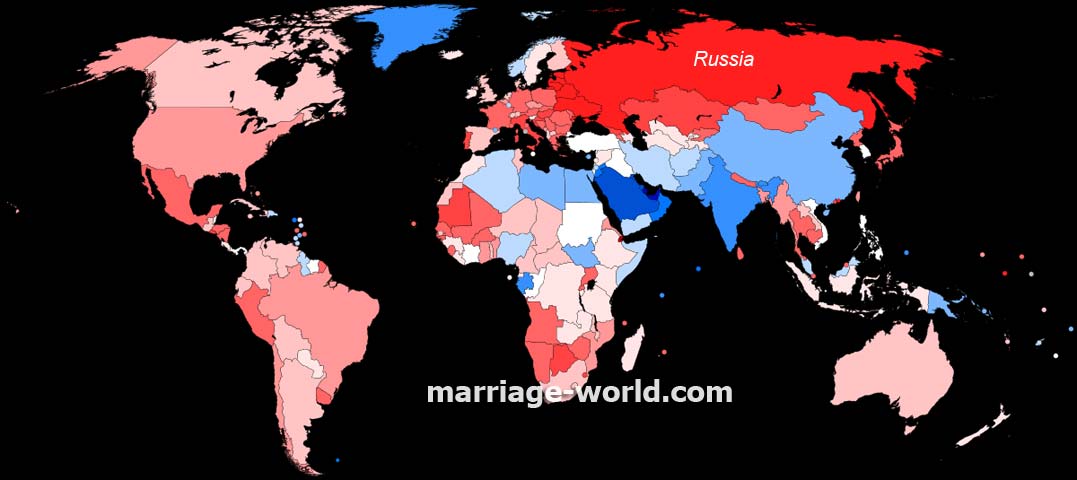Is it true that women are more than men in Russia?

According to Rosstat (Russian federal state statistics service), in 2020 in Russia there will be on average 866 men per thousand women. This is not the case in other countries of the world. Where did this gender inequality come from, when all the wars seemed to be far behind?
Below is a map of men and women sex ratio in the world. The redder ones are the higher percentage of women living in the country. The light pink ones are roughly equal, with a slight preponderance of women. The blue - countries with a higher percentage of men.
 men and women ratio in the world
men and women ratio in the world
Men are about 46% of the population of Russia, and women about 54%. In the U.S., the ratio, respectively, is 49.7% of men versus 50.3% of women. In the vast majority of countries, the number of men and women is also about equal.
So, why are there more women than men in Russia? Below is what foreign experts think about this topic.
Ramkumar Natarajan, political scientist, India
There is a famous song in Russia: "Because statistically there are nine boys for every ten girls. It reflects well the situation of gender imbalance in the country.
Gender inequality in Russia did not happen all of a sudden. The first census in 1897 showed that there were 98.9 men for every 100 women. (Author's note - and how does this Hindu know so much about us? Note - he just started throwing out facts. There's more from here).
The world wars have greatly increased this bias. It's no secret that it was Russia which took the brunt of the German onslaught, both in WWI and WWII. The Civil War and Stalin's "Great Purge" aggravated the situation. According to the 1939 census, there were already 91.9 men for every 100 women in Russia. After WWII, the ratio changed to 81 to 100.
And even 45 years later it has not evened out. Shortly before the collapse of the USSR, there were 89.5 men for every 100 women. The bandit 90's also contributed. So why does the ratio hold up like this, even though the effects of the war should have smoothed out?
Young men in Russia have an unusually high mortality rate from alcoholism. This, on average, has resulted in women in Russia living much longer than men (77.6 years vs. 66.9 years).
According to WHO (World Health Organization) estimates, all over the world, women live only 4 years longer than men. And in Russia - by 11 years!
And up to the age of 34 there are more men, but after this age the ratio begins to change. And this has a negative effect on the birth rate.

Brian Collins, sociologist and linguist, Australia
Russia is an unusual country. There is no other country in the world where women live so much longer than men. Lithuania and Latvia have similar figures, but those countries border Russia.
In China and Australia, for example, women live only three years longer than men.
In terms of life expectancy of women, Russia is at the level of developed countries. But men here live as little as in disadvantaged countries. Even in Albania men live 9 years longer than Russians.
Boys in Russia are born more than girls - 54%. In the period of 30-34 years, the number of men and women equalizes. And then there is a sharp decline in the male population. There are twice as many 70-year-old women as men.
In Russian culture, men traditionally take on higher-risk jobs. So because of the heavier, more intensive and prolonged work, the mortality rate of Russian men in their 40s and 50s is just off the charts.
As far as Asian countries are concerned, abortions on the basis of gender are common here. And boys are willingly left behind, because they are the future breadwinners in retirement. Hence the strong skew towards men.
Michael Bass, works in healthcare, United States
The main factor is alcoholism, which has always been an epidemic in Russia. Alcoholism affects men more than women. In addition to direct health damage, men often die because of alcohol-related crimes and accidents. And, in general, Russian men prefer to lead an unhealthy lifestyle.
There are also a number of other interesting features in the Russian mentality. Men here do not trust doctors. That is why there are many more female patients in clinics.
There are crazy drivers in Russia. Tragic accidents are not uncommon here. And Russian women drive much safer.
And then, of course, there's migration. Classic brain drain. A lot of scientists, programmers, engineers from Russia have moved to the West. In general, men are more likely to migrate than women.
The Babushka (grandmothers) hypothesis
In addition to the imbalance in Russia, we want to summarize this gender inequality with one interesting fact.
American anthropologist Kristen Hawkes observed the life of wild tribes at the end of the last century. And she made a curious hypothesis. Women live longer because society needs grandmothers more than grandfathers!
Grandmothers look after the children and pass on valuable knowledge to them. And they free the parents for other things. Societies where many grandmothers survived have evolved more efficiently. So the gene complex has taken hold.
This is perhaps doubly characteristic of Russia. The role of grandmothers has always been great here!

